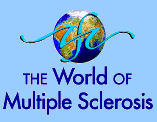A technique called "naked DNA" vaccination could aid immune system diseases such as multiple sclerosis and rheumatoid arthritis. Reporting in the Journal of Clinical Investigation, researchers from Israel say they have successfully tested the vaccines on animals.
Both MS and rheumatoid arthritis are conditions in which symptoms are caused by the body's own immune system launching an attack on its own tissues in the same way it would attack a foreign object. In MS sufferers the sheath protecting the nerves is the target, leading eventually to severe disability, while in rheumatoid arthritis, tissues in the joints are affected.
Part of the unwanted immune response causes inflammation by producing natural chemicals called cytokines and chemokines. Remarkably, the approach of the new vaccine is to make these chemicals the target of the immune system.
It involves introducing engineered genes which appear like the culprit cytokines and chemokines in an effort to make them appear like an outside invaders. While the injected genes do not themselves act like the cytokines and chemokines, and cause damage to body tissues, they should provoke an immune response. This should then mop up the inflammatory chemicals and prevent any more damage. In theory, such a vaccine could be particularly valuable in MS and rheumatoid arthritis, which are progressively more disabling.
Dr Nathan Karin, leading the research at the Technion-Israel Institute of Technology, said that the idea was to teach the immune system "how to correct its own mistakes". He said: "Our laboratory has clearly shown that the major advantages of these self-generated antibodies lie not only in that they do not provoke an immune response, but also, and most importantly, in the ability they endow to the immune system to self-regulate their production in accordance with disease progression."
Now the team intends to examine ways of delivering the genes into humans before finally moving onto human trials. Any effective "vaccine" would be a significant breakthrough in auto-immune diseases such as MS and rheumatoid arthritis.
A spokeswoman for the Arthritis Research Campaign, which is currently funding similar work into developing vaccines against rheumatoid arthritis at King's College, London said the Israeli research sounded exciting. However, she sounded a note of caution. "The use of genetic vaccination has inherent dangers because it may be difficult to reverse the effects if something goes wrong," she said. "The Israeli vaccine appears to be an extension of the work at the Kennedy Institute, which has led to the development of exciting new therapies for rheumatoid arthritis. But rather than making antibodies outside the body, the Israeli researchers are immunising animals to make their own antibodies against infection, which is what makes it different."
Drugs available at the moment can lessen the damaging immune responses, but not halt it completely. In MS, beta-interferon, the most effective treatment produced so far, holds back the number of attacks but does not prevent eventual disease progression.
